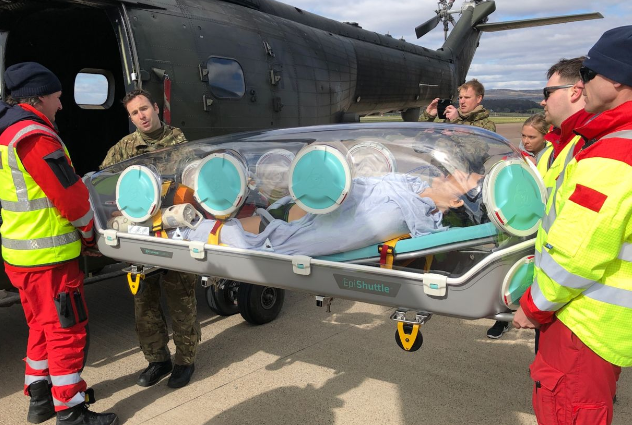Sealed isolation pods will be used in Western Isles patient airlifts
2 April 2020
Sealed pods will be used to transport coronavirus patients during emergency airlifts from the Western Isles.
The see-
Protection for for the air crew and emergency teams is maximised by preventing them from catching the virus from the patient.
The new device -
To date, eight of these shuttles have been purchased for Scotland, costing a total of £500,000.
Two were fast-
A further pair will be received on 17 April and another four by mid-
They also be deployed by the RAF helicopters covering the Hebrides and north Scotland.
Sergeant Stephen Cassidy, senior crewman of the Puma detachment in Kinloss, explained: “Ahead of the training, our engineers changed the aircraft to a 6-
“Removing the additional seats allows us to transport the required medical staff to treat the patient and safely accommodate the epishuttle and associated medical equipment.
“It’s similar in size to the NATO stretcher that we’ve transported on numerous operations but it’s much easier to load and secure because of the fixed wheels when taken off the gurney.”
Health Secretary Jeane Freeman said: “Epishuttles are designed to protect patients and crew from potential infection and safely transport patients on fixed wing aircraft.”
She added: “We’ve been working closely with the Scottish Ambulance Service (SAS) to significantly increase capacity for airlifting patients off the islands and to ensure that any patients from our island communities with Covid-
“The first batch of Epishuttles will be available from this Friday, with plans well underway to increase the number of these single patient isolation pods in the coming weeks.
“In the meantime, SAS is working with the RAF who are currently providing cover for transfers off the islands, using three puma helicopters based at Kinloss which can transfer some patients without epishuttles.
“Our NHS is on an emergency footing and all health boards have been undertaking extensive work across Scotland to maximise the capacity available to manage expected rise in demand due to Covid-
Pauline Howie, chief executive of the Scottish Ambulance Service, said: “The fight against Covid-
